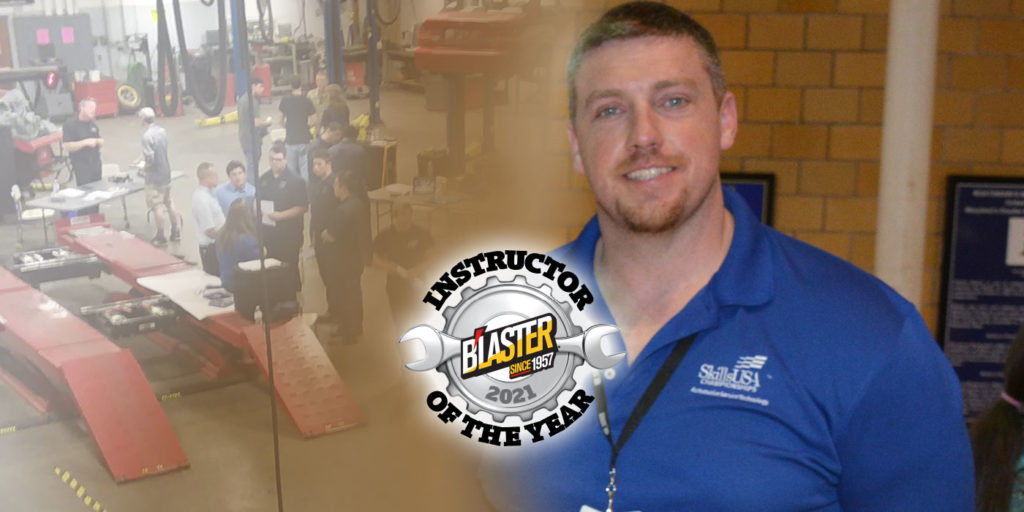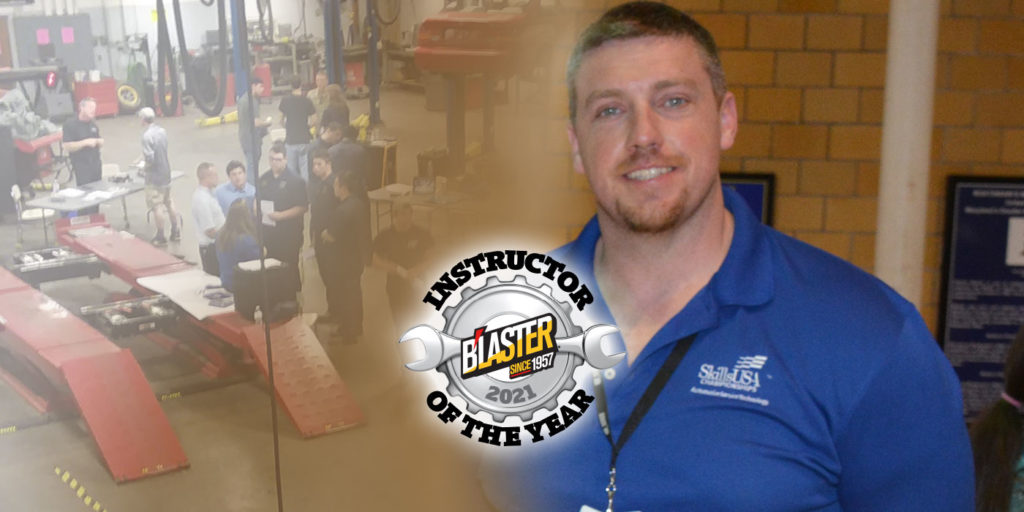
With an interest in and ability to work on a variety of different models of vehicles, Tracey Hicks found himself to be somewhat of an anomaly as technician at a BMW dealership. Yet his willingness to go beyond what was simply expected to what was actually needed set him up well as an automotive technology instructor.
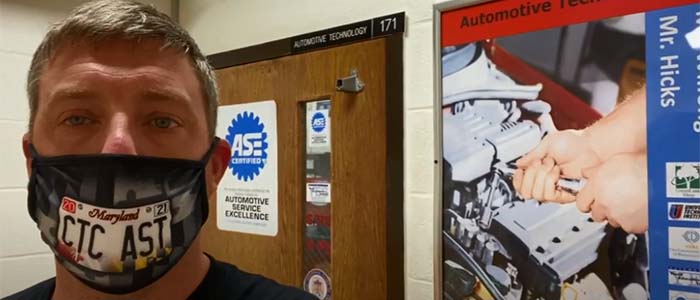
“I think I just wanted to challenge myself,” said Hicks.” At the BMW dealership, nobody really wanted to work on anything other than BMWs. Any of the sales guys who needed work on a Mustang or whatever would come to me. I became the go-to guy for all the other brand cars. I wanted to try something different other than the dealership.”
Hicks says this led him to an independent shop and, eventually, back to the same school from which he had graduated.
“It’s become one of the things I use to teach my students now,” he says. “It’s about walking through the doors that open.”
Tracey Hicks, automotive instructor at Frederick County Career and Technical Center, Frederick, MD, was recently named the January finalist in the B’laster Instructor of the Year contest, presented by Tomorrow’s Technician. He says his students don’t always know what they want to do when they graduate, yet they have an interest. “We just need to open doors for them, and hopefully they’ll see that one will lead to another door. And that’s what happened for me.”
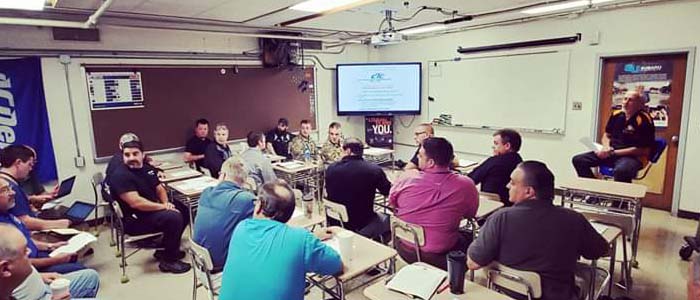
Hicks recalls that, like many of his students, his career path has been anything but straight.
“It’s been a long, windy path,” says Hicks. “My dad was a construction worker and my mom was a school teacher at a private school. I was probably about seven when my dad got me started racing go karts. That pretty much became my whole life outside of school. Frankly, I wasn’t interested in cars at that young of an age.
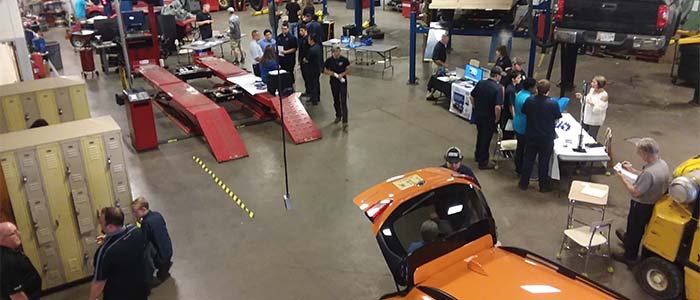
“In middle school my dad brought home some used computers and he encouraged me to get into them. He didn’t really want me to go into a trade, because he has worked his whole life in trades and he’d rather see me do something easier,” Hicks says.
In his sophomore year of high school, Hicks says he took a TV multimedia class that had just started. “I could work on the computer side of it,” he says, “but I wasn’t very good at the creative side of it. Plus, to go anywhere with it I was going to have to go to college and I really wasn’t really too keen on going to college.”
Hicks says his future as a go kart driver came to an end when got his work permit at age 14. “When that happened, I hung up the helmet and it seemed like the end of my involvement with vehicles. But at some point, I remember looking through the high school scheduling book and saw a diesel and automotive technology program here at the CTC. I signed up for my junior year. At the time, there wasn’t a lot of structure and curriculum, we just worked on cars. There were some cars laying around that had been donated, so we learned by working on what we had.”
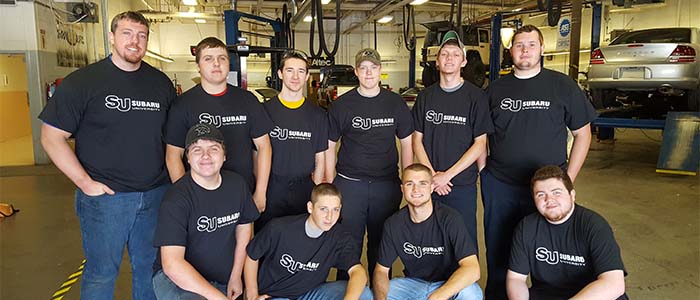
Some new instructors his senior year started reinventing and rebuilding interest in the program. They planned to make two classes, and that actually happened the year after Hicks graduated.
“We spent my senior year getting rid of all the junk and cleaning up, still working on cars, and basically getting ready to transition it from a diesel and automotive program to just an automotive program. I decided I really want to learn more about this at that time.
“A recruiter from UTI named Greg Sullivan came in and, though I don’t know why, something clicked. I saw myself going to school for automotive. Went home and told my mom and she was stunned. ‘You want to go to school?’ She didn’t know what to say – she couldn’t believe it, I guess,” Hicks laughs.
Hicks says his time at UTI’s Chicago campus was beneficial. “Everything that I learned just stuck with me and I ended up doing really well out there. I got a job at a little shop across the street from my apartment, just helping the mechanics who were working there. I just paid attention, and did everything my instructors asked me to do, and won a couple Student of the Phase awards in a couple classes.”
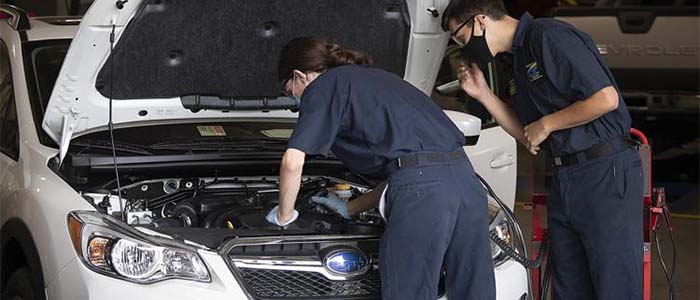
Eventually, Hicks recalls, one of the guidance counselors came in to a class and asked if anyone was from the Maryland area and wanted to interview with a dealership. “We were probably three or four months away from graduation at that point, so I interviewed with Steve Daly from BMW of Arlington (VA). It’s about 75 miles away from home and, though I always imagined I’d just end up working in the local Chevy shop, I found out I could make $500 a week and get into the BMW education program once I applied. This just took my idea of where I was headed and went whoop, you’re going this way.”
Hicks says he thrived with the pace and the product at the BMW dealership. “I worked with the shop foreman on all these brand-new cars that I’d never even seen before for about three or four months, and then I went to Florida for six months for BMW factory training.”
Unlike some of his fellow students at the factory training facility, Hicks knew he had a contract waiting for him.
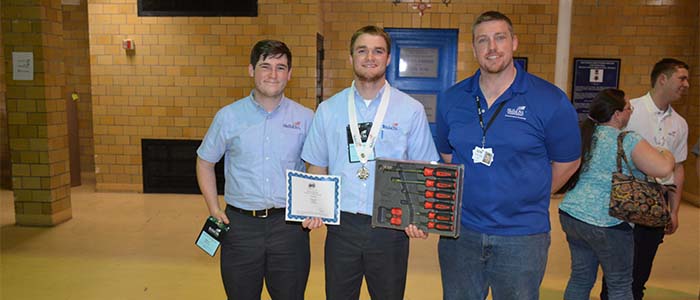
“I was so excited to get on flat rate and start working and making some money,” Hicks says. “Through that experience, I got enough credentials to be master certified with them before setting out into the independent field, transitioning to working on everything.”
Hicks says that during his career at BMW and independent repair facilities, he stayed in contact with his high school instructor Gary Wilfong. “I also became a member of the school’s advisory council. I was still in my early ’20s but was starting to help with setting up and judging local and regional Skills USA contests for them.
“As I moved through independent shops, I ended getting different certifications for BMW, Hyundai, GM, Kia, Nissan, Toyota, as well as multiple ASE certifications. I had eventually switched to the management side of the dealership world and started thinking about teaching at one of the other small high schools in the county that had an automotive program,” Hicks recalls. “But it wasn’t full time, and it didn’t really have a curriculum or anything. I thought I was a little too young to try to take something like that on.”
Fast forward a bit further to 2016 and Hicks says he was set to become the chair of the advisory council at Frederick County Public Schools when the director of the CTE department asked me if he had ever applied at the school. “I had an application started from that other job at the other school, I just never finished it because I didn’t think I was the right time or the right person for that,” he says. “It turned out that Mr. Smith, the other instructor from when I was a student, was getting ready to retire. At that point I felt like I had enough experience and enough knowledge and certifications, and enough understanding of how this program worked and how far it had come that I just wanted to be a part of it.”
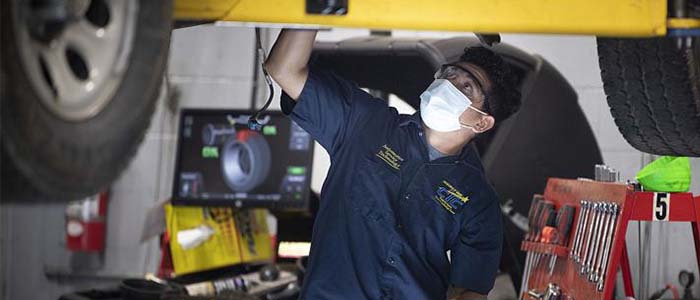
Hicks says, “I wanted to put myself in that situation, because I knew I could really drive the students and give them what they needed to get started in the field and be successful right off the bat.”
As he explains to his students, it’s about taking advantage of the opportunities when they’re presented. “I was in the right place at the right time, and it’s been really good. This last year has been a struggle but it’s nothing we can’t handle. Hopefully it ends sooner than later. But the kids are doing what they can.”
Hicks says he reminds his students that virtual training isn’t anything new. “For the last six or seven years of my career, all my technical training has been virtual,” he says, “so it’s not going away. If you’re going to be a technician, and you want to continue to learn and take classes, you’re going to do virtual learning. This is a great time to get used to it.”
Hicks says he wouldn’t be in the position he is today if not for the guidance and support of his parents. “My dad passed away during my second year of teaching from his second battle with cancer. Then a year later my mom was diagnosed with breast cancer – keeping going was very difficult during that time. But the drive, work ethic and constant encouragement they instilled in me was crucial to me then and remains a big part of my teaching philosophy today.”
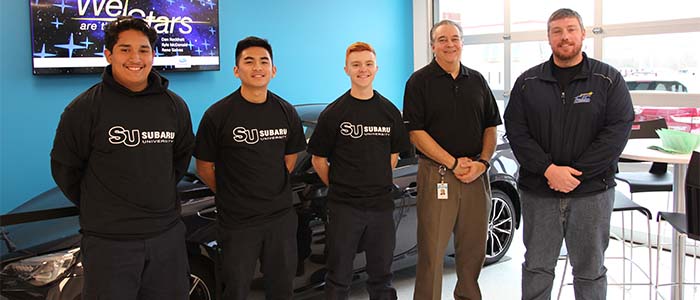
Hicks praises his school district for its commitment to his program and credits his advisory board for championing the causes. “As I said, our advisory council committee is incredible. We’re in a pretty rural area, even though the cities of Washington and Baltimore are kind of pushing this way. But our whole state comes up to our school for our PAC meetings and tries to recruit kids. They probably drive past three or four tech schools on the way up here to come up and interview students and participate in our advisory council. And it’s just about the basics – our kids understand strategy-based diagnostics, they understand the flat rate system, they understand efficiency, they understand how to be professional. We are producing a different type of student.”
Hicks credits his predecessors Smith and Wilfong with setting the bar at such a high level. “Gary continues to do a great job,” Hicks says. “We’ve got an eight bay shop with about three or four flat stalls and a couple mid-rise lifts; we’ve got all the new Snap-On diagnostic equipment with all the certifications; we have the Hunter Hawkeye alignment rack, along with an older Hunter alignment rack so students can how to set up and perform an alignment on whatever equipment their new employer has. We have tire equipment, including an older style balancer as well as a road force balancers, and two different style tire changers.
“We’re just trying to get them as much experience and as much knowledge as they can handle right now, to get them in the industry and be successful. If they don’t find success in those first couple years, they’re going to change their mind, go drive a truck or do construction or landscaping.”
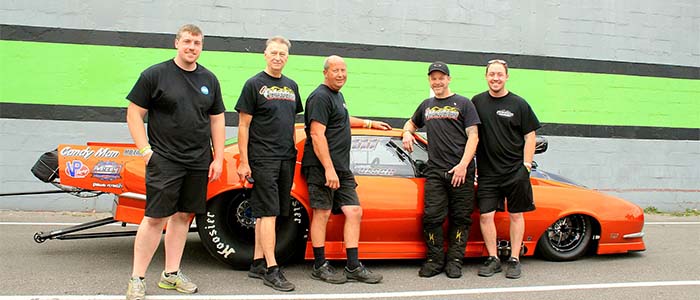
Hicks says his goal is to not have that happen. “But if it does happen, I want them to figure it out here and not after they’ve taken the next step with college or tech school debt and figure out that it’s not cut out for them.”
He’s proud to say that he regularly hears about the knowledge level of his students, often from neighboring school districts. “We’re constantly being told that our top-level students are better than anything coming out of any of the schools, even some of the colleges.”
Hicks says being named the B’laster January Instructor of the Year finalist is like a breath of fresh air. “It’s been such a tough year. During the best of years, you just don’t seem to get a lot of credit – it can be kind of a thankless job at times. Yeah, we’ll get kids every now and then who get it and they’ll come back and say, ‘Man, I’m so appreciative of what I learned here.’ But other than that, sometimes it feels like we’re just changing lives behind the curtain. This was just a big old pat on the back for me and I appreciate it.”
The B’laster Corporation – makers of the penetrant, PB B’laster – is again searching for the third annual automotive technology B’laster Instructor of the Year. In partnership with Tomorrow’s Technician, B’laster will again recognize exceptional automotive technology instructors at high schools, vo-tech programs and community colleges across the United States.
Each month, Tomorrow’s Tech and B’laster will choose an instructor story to feature in an online interview format. Seven instructor stories will be chosen from November 2020 through April 2021, and those instructors will be entered into the final round to be named the B’laster Instructor of the Year in May 2021.
Automotive technology instructors are invited to nominate themselves, or students and community members can nominate their instructors that are doing an exceptional job. Nominations can be submitted here.

